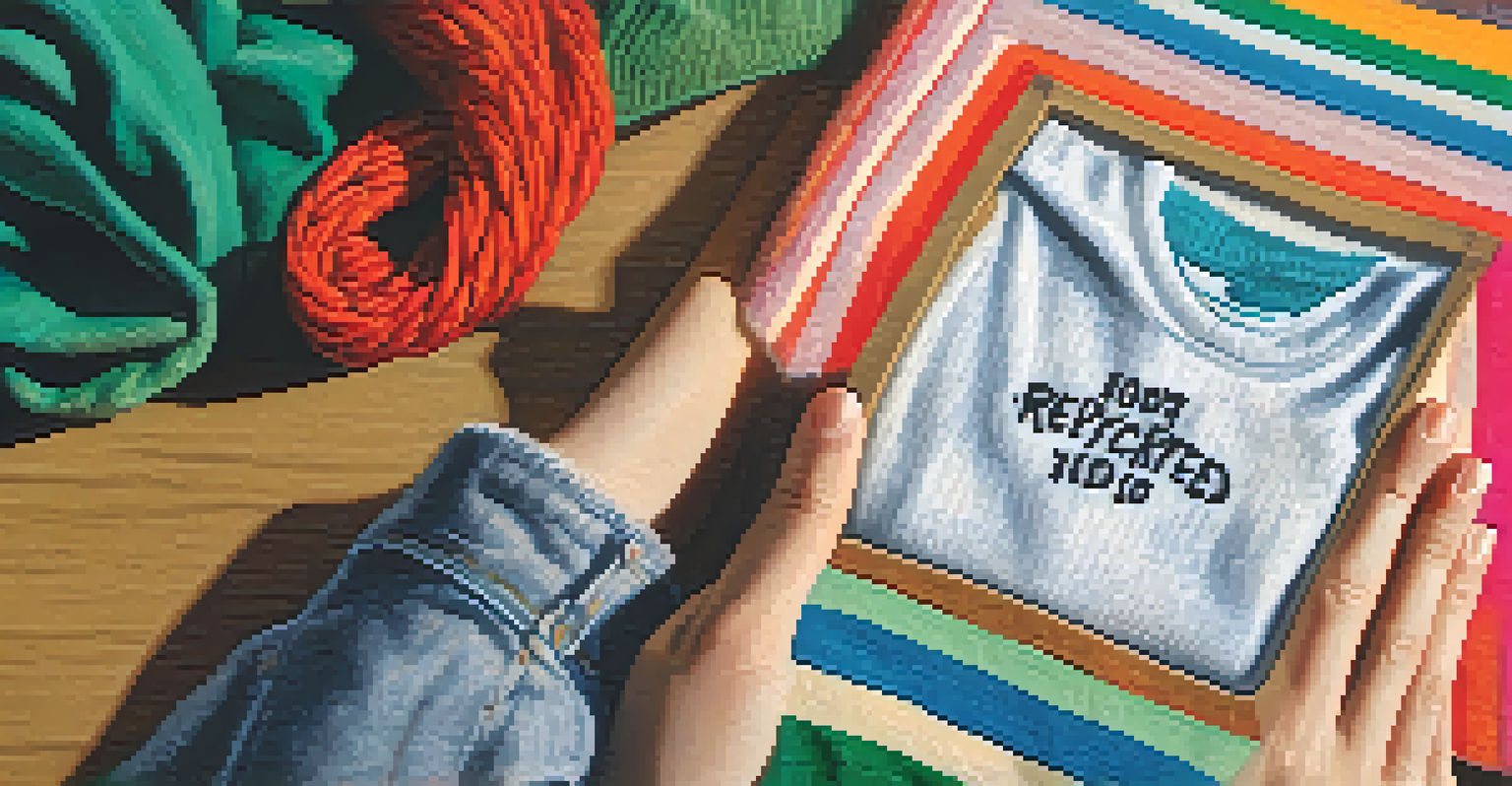Fashion Sustainability: Trends Shaping the 2020s Landscape

Understanding Fashion Sustainability and Its Importance
Fashion sustainability refers to the efforts made by brands to reduce their environmental impact and promote ethical practices. This approach encompasses everything from sourcing materials to the treatment of workers throughout the supply chain. As awareness of climate change and social justice grows, consumers are increasingly demanding transparency and accountability from the brands they support.
Fashion is the armor to survive the reality of everyday life.
The importance of sustainability in fashion cannot be overstated. The industry is one of the largest polluters globally, contributing to waste, water usage, and carbon emissions. By adopting sustainable practices, the fashion sector can play a vital role in combating these issues and fostering a healthier planet.
Sustainable fashion isn't just a trend; it's becoming a necessity. With more consumers prioritizing eco-friendly choices, brands are recognizing that sustainability can also drive innovation and growth. This shift in mindset is leading to exciting developments in materials, production processes, and business models.
The Rise of Circular Fashion Models
Circular fashion is a concept that promotes a closed-loop system where garments are designed to be reused, repaired, or recycled. This approach contrasts with the traditional linear model of 'take, make, dispose', which has led to significant waste. Brands adopting circular practices are focusing on creating products that last longer and can be returned for new life after their initial use.

One of the most popular examples of circular fashion is the rise of resale platforms and clothing rental services. Companies like ThredUp and Rent the Runway are making it easier for consumers to buy second-hand or rent high-quality pieces, extending the lifecycle of garments. This not only helps reduce waste but also allows individuals to enjoy fashion without the guilt of overconsumption.
Fashion's Shift Towards Sustainability
Brands are increasingly adopting sustainable practices to meet consumer demand for eco-friendly options.
As we move further into the 2020s, expect to see more brands embracing circularity. This shift will likely inspire new collaborations and innovations, such as clothing take-back programs, upcycling initiatives, and sustainable design practices, all of which aim to reduce fashion's impact on the environment.
Innovative Materials: Pioneering Sustainable Textiles
Innovation in materials is a cornerstone of sustainable fashion. Designers and brands are increasingly exploring eco-friendly alternatives to traditional fabrics, such as organic cotton, hemp, and even innovative materials like pineapple leather and mushroom-based textiles. These alternatives help reduce the environmental footprint associated with conventional fabric production.
Sustainability is no longer about doing less harm. It's about doing more good.
For instance, brands like Stella McCartney champion the use of sustainable materials, integrating them into high-fashion collections. This not only delivers stylish pieces but also raises awareness about environmental issues. By showcasing these innovative materials, brands can inspire consumers to make more mindful choices in their fashion purchases.
As technology advances, we can expect even more breakthroughs in sustainable textiles. Innovations such as bio-fabrication and recycled fibers are paving the way for a future where fashion is not only beautiful but also environmentally responsible. The challenge will be for brands to balance style and sustainability in a way that appeals to conscious consumers.
Consumer Demand: Shifting Attitudes Towards Sustainable Fashion
Consumer attitudes towards fashion are evolving rapidly. Today’s shoppers are more informed and conscious of the impacts their purchases have, leading them to seek out sustainable options. This growing demand for ethical products has prompted many brands to rethink their practices and prioritize sustainability in their missions.
Social media plays a pivotal role in this shift, as platforms like Instagram and TikTok amplify conversations around sustainability and ethical fashion. Influencers and activists are shining a spotlight on brands that prioritize eco-friendliness, encouraging their followers to make responsible choices. This increased visibility has led to a significant rise in the popularity of sustainable brands.
Embracing Circular Fashion Models
Circular fashion promotes reuse and recycling, reducing waste and extending the lifecycle of garments.
In response to this demand, brands are not only adopting sustainable practices but also actively communicating their efforts to consumers. Transparency, storytelling, and clear messaging about sustainability initiatives are becoming essential components of brand identity, helping to foster trust and loyalty among consumers.
Ethical Labor Practices: The Human Element in Fashion
While environmental sustainability is crucial, ethical labor practices are equally important in the fashion industry. Many consumers are becoming aware of the harsh realities faced by garment workers, including poor working conditions and unfair wages. As a result, there’s a growing demand for brands to ensure ethical treatment of their workers.
Brands that prioritize ethical labor practices often emphasize fair wages, safe working conditions, and transparency in their supply chains. Companies like Everlane and Eileen Fisher are examples of brands that have committed to ethical labor standards, providing consumers with the assurance that their purchases contribute to positive social impact.
As awareness of labor issues continues to rise, expect to see more brands adopting ethical practices as part of their core values. This shift not only promotes better working conditions but also aligns with the growing consumer preference for brands that prioritize social responsibility alongside environmental sustainability.
Technology’s Role in Advancing Sustainable Fashion
Technology is playing an increasingly significant role in advancing sustainable fashion. From blockchain for supply chain transparency to virtual fitting rooms that reduce returns, innovative tech solutions are helping brands become more sustainable. These advancements help to minimize waste and ensure that consumers make informed purchasing decisions.
One exciting development is the rise of 3D printing, which offers a way to produce garments on-demand, reducing overproduction and wasted materials. Additionally, AI is being used to analyze trends and consumer preferences, enabling brands to create products that better meet demand without excess inventory.
Technology Fuels Sustainable Innovation
Technological advancements like 3D printing and AI are enhancing sustainability in fashion by minimizing waste.
As technology continues to evolve, we can anticipate even greater efficiencies and innovations in sustainable fashion. By harnessing these tools, the industry can work towards a future where style and sustainability go hand in hand, creating a more responsible fashion ecosystem.
The Future of Fashion: A Sustainable Vision Ahead
Looking ahead, the future of fashion appears to be rooted in sustainability. As more brands adopt eco-friendly practices and consumers demand responsible options, a shift in industry standards is inevitable. This trend indicates a growing recognition that sustainability is not just a fad but a vital component of the fashion landscape.
Collaboration will be key to driving this change. Brands, consumers, and even policymakers must work together to create a more sustainable fashion ecosystem. Initiatives like the Fashion Pact, which brings together various stakeholders to commit to environmental goals, highlight the collective effort needed to make a significant impact.

Ultimately, the future of fashion holds promise for a more sustainable and ethical industry. As we embrace this new landscape, we can look forward to a world where fashion not only reflects our individuality but also honors our responsibility to the planet and its people.